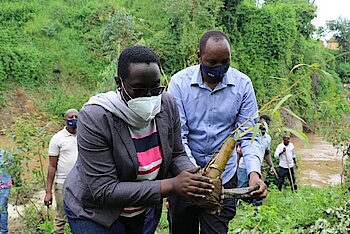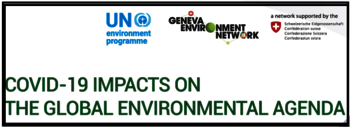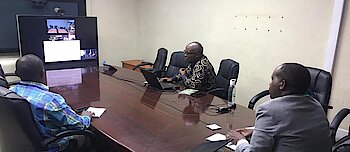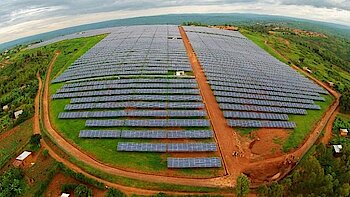
Strengthening Transparency in Climate Action: Rwanda's Progress under the Enhanced Transparency Framework
Climate change is a global challenge that requires urgent action. Rwanda, like many other countries, is experiencing the impacts of climate change, such as extreme weather events. In response to this, Rwanda has made significant efforts to mitigate and adapt to climate change. One crucial aspect of its climate action is the implementation of the Enhanced Transparency Framework (ETF) under the Paris Agreement. This article highlights Rwanda's progress in strengthening transparency in climate action through the ETF.
Enhanced Transparency Framework and Its Importance:
The Enhanced Transparency Framework (ETF) plays a vital role in promoting transparency and accountability in climate action. It requires countries to provide accurate and timely information about their greenhouse gas emissions, climate policies, and progress toward their climate goals. By adopting the ETF, countries can measure, track, and compare their progress, ensuring effective climate action.
Rwanda's Commitment and Progress:
Rwanda, as a signatory of the Paris Agreement, is committed to implementing the ETF and has made significant strides in this regard. The country's commitment is evident through its Capacity Building Initiative (CBI), which focuses on enhancing transparency and building capacity for reporting on climate action. Rwanda actively participates in training programs, technical workshops, and collaborations on data management and reporting. These actions demonstrate Rwanda's dedication to the ETF's principles.
Capacity Building for Reporting on Climate Action:
Rwanda recognizes the importance of building capacity for accurate reporting on climate action. The government has prioritized enhancing the capacity of its agencies, civil society organizations, and stakeholders to collect, analyze, and report on climate data. Through training programs, technical assistance, and support for data collection and management, Rwanda aims to equip its experts with the necessary skills to report on its climate change actions and progress effectively.
The Capacity Building Initiative for Transparency (CBIT) in Rwanda:
Rwanda actively participates in the Capacity Building Initiative for Transparency (CBIT), funded by the Global Environment Facility (GEF) through Conservation International. The CBIT project in Rwanda focuses on increasing the capacity of national experts across various sectors, including government institutions, line ministries, higher learning institutions, and the private sector. These experts receive training on tools and methodologies for climate change reporting, enabling them to accurately report on Rwanda's climate actions and progress.
Strengthening Analytical Capacity:
A core objective of the CBIT project in Rwanda is to produce a cohort of national experts with strengthened data analysis and climate modeling skills. These experts will effectively analyze climate data and use climate modeling tools to assess potential future scenarios. This enhanced analytical capacity will facilitate evidence-based decision-making and policy formulation regarding climate change mitigation and adaptation in Rwanda.
Streamlined Climate Reporting:
Rwanda has also taken steps to enhance climate reporting by developing an online-based tool for collecting greenhouse gas (GHG) activity data. This tool streamlines the process of data collection and management related to GHG emissions and activities. By utilizing this online tool, Rwanda can improve the accuracy and timeliness of its climate reporting, further supporting the transparency and effectiveness of its climate action.
Biennial Transparency Report (BTR):
As part of the ETF, Rwanda is preparing a Biennial Transparency Report (BTR), a key component of its transparency efforts. The BTR will provide comprehensive information on Rwanda's greenhouse gas emissions, progress toward climate goals, and climate policies and measures. It will also highlight Rwanda's efforts in capacity building for climate action reporting and stakeholder engagement. Additionally, the report will showcase the progress made in implementing Rwanda's National Determined Contribution (NDC), which outlines the country's climate goals and targets.
ETF Through its commitment to capacity building, engagement in the CBIT project, and the development of streamlined reporting tools, Rwanda is demonstrating its dedication to effective climate action. By ensuring transparency and accountability.
Topics
More posts
Rwanda’s NAP Project funded by GEF was launched
The Global Environment Facility (GEF)-funded $6 million project “Building the capacity of Rwanda’s government to advance the National Adaptation…
Rwanda Pledges emissions cut of 38% in its climate action plan by 2030
Rwanda as a signatory to the Paris Agreement under which countries are due to update or communicate their 2030 emission-reduction plans, it submitted…
The Geneva Environment Dialogues discussed the impacts of the COVID-19 on the global climate change agenda
The dialogues took place on Tuesday 19 May, 2020 from 9: 00 to 9:50 on Facebook live, as way of communicating in this time of COVID-19.
this session…
Assessment of Rwanda’s vulnerability to climate change was presented to local authorities
Rwanda Environment Management Authority (REMA), with the logistical support of Ministry of Local Government (MINALOC), hold a video conference with…
Coronavirus responses proves the World can act on Climate Change
The COVID-19 pandemic has provoked a global response unlike anything we have seen before. Governments have witnessed transformational changes that…
COP 26 postponed due to the disruption caused by COVID-19
This crucial climate summit is the 26th session of conference of Parties (COP26) to the UNFCCC and it was scheduled from 9-19 November 2020 in…
Be self-accountable to tackle Climate Change and save environment
Climate change has already begun to impact our planet in more ways than we can think. Temperatures continue to rise throughout the planet and we are…
Switching to electric vehicles is a mean to reduce greenhouse gases emissions and improve air quality in the City of Kigali
Over the last 150 years, human activities have greatly contributed to the increase of greenhouse gases in the atmosphere, which make the planet…
Green Growth as an Opportunity for Business
Twenty-eight years after the Rio Summit, the countries embrace the vision for development by expanding the economy and addressing the environment…








